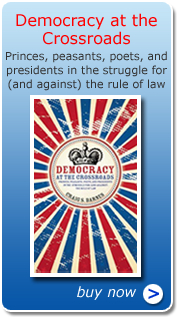Americans like action movies and westerns and war stories and football games and things with sharp and dramatic endings. We like drama. People like a president who leaps into the saddle and proclaims “Let’s roll!” and sends the posse off to the mountains of Afghanistan to seek and destroy. It makes for better news and more listeners to the radio, readers of the paper. We are like dogs who perk up when the wolf comes loping down the draw. Here comes action.
But one of the most dramatic stories this week is very quiet and not dramatic. The Russians are about to join a Russia-NATO Council that will give them participation in NATO decisions on terrorism, missile defense, regional security and air space administration.
There was a time in the early 1950s when Air Force Secretary Stuart Symington recommended to President Harry Truman that we eliminate the Russian threat by dropping a nuclear bomb on them. There was similar advice, reportedly, to President Richard Nixon in the 1960s. During the height of the Cold War there were hawks who said that the only way to overcome Soviet communism was to blast them off the earth. The war rhetoric lasted for two generations. Because the weapons to accomplish victory were nuclear, the cost in human suffering would have put us all back toward the stone age. Nevertheless, we seriously considered killing millions. The most dramatic news in years, therefore, has to be that these same Russians have now become allies. What is even more singular is that it has happened through patience and diplomacy, through years of living with tensions not resolved through war, but, to the contrary, resolved through talk, time, and the persistent search for alternatives.
The first time I went to participate in talks in Moscow in the mid-1980s, the place was like a dark tomb. We could not meet people in their homes and the KGB listened in to our hotel rooms. We were driven about in official cars and fear was everywhere in the population. We were absolutely safe on the streets because the penalties for crime, for aberrant behavior, for creating a bad Soviet image, were disastrous. We were probably safer at eleven at night on the streets in Moscow than at home. We were also under total tyranny. We could not imagine that the Soviet empire would collapse or that Russia would become a working partner with NATO. But it did happen, and it happened without a shot being fired.
Military advocates to the contrary notwithstanding, this Russian development is not an historical aberration, an anomaly. Since 1946, a small, but growing, corner of the planet has come to reject war as a way to solve their traditional conflicts with one another. Invasion and counter-invasion, once as predictable as rain between Germany and France are today unthinkable. It is more unlikely between these two peoples than it has been since Julius Caesar, 2000 years ago. The same can be said between England and Spain, or England and Germany, or Italy and France, all traditional warring parties. Today for these peoples, as between them, war simply is obsolete. We could add that war between the US and Canada or the US and Mexico is also simply not an option for us anymore, no matter how serious our problems may become.
Since 1991, the tide of this un-warlike and unusual conduct has been seeping east toward Hungary, Poland, Latvia, Lithuania. Most of the globe, of course and to the contrary, still believes in war. But the dramatic news is not that most of the globe is like it always was. We knew that. The dramatic news is that certain populations, and certain leaders like Vladimir Putin of Russia, are coming to the conclusion that cooperation, process, votes, and collective decision-making within NATO is safer than unilateral bluster and the claimed righteousness of ideology.
These are not good times, on the whole, for civilization. War machines are grinding and militarists are claiming more resources. But this one thing is quite remarkable: Russia is joining, step by step, the nations of process, the nations which vote, the nations which talk before they shoot. They might even get us back into that habit.
